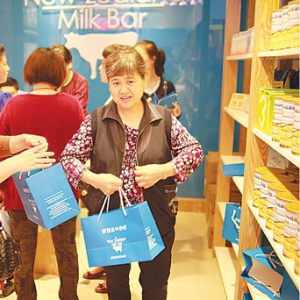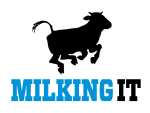A Kiwi company specialising in selling milk products to China is planning a major expansion and is planning to raise $10 million to do this.
Biopure exports milk products including infant formula to China, selling through its own network of 25 stores called the New Zealand Milk Bar, in 23 cities and six provinces. It hopes to have 1000 stores by the end of 2017.
Biopure recently gained Chinese registration for its Infapure infant formula brand, a “game changer”, says managing director Simon Page. He and his wife Jane Li opened their first stores in 2012 in Chengdu City, Sichuan province, in southwest China.
They first imported clothing from China, but after the Sanlu melamine scare Chinese contacts asked them to sell New Zealand dairy products. The new business has grown and taken on a life of its own, Page says.
“In our stores we sell a range of our niche dairy products. Our instant whole milk powder is a top-selling product, sold in 1kg bags. We also sell skim milk powder and infant formula and we have Fonterra Anchor UHT milk which we get directly from them in China. We have also tried other specialty powders such as goat milk in 400g tins and we’ve sold Whittaker’s chocolate, getting a good response.”
Page says they have resisted the temptation to sell other New Zealand products such as wine and manuka honey, instead sticking with dairy products – what they are known for. Cheese is a possibility, he says.
While the idea of a niche specialty store like the Milk Bar may seem unusual to New Zealanders, Page says there is now a proliferation of direct import stores like theirs in China. “Foreign products are increasingly popular with the Chinese middle class.”
Page says of all New Zealand’s offerings, milk is what the country is most famous for so they decided to compete in that market and tap into the popularity of foreign products. “For us milk is the point of difference,” he says.
Milk Bar’s success has given Page and Li the confidence to go one step further in their expansion programme – hence the need to raise more capital, he says.
“We’re moving into a different phase now that we have certainty of product supply; we’re working on a ‘store in store’ strategy. We have six well resourced Chinese partners and they have a huge reach into traditional channels.
“This new strategy will see us have our Milk Bar stores in large supermarkets or baby store chains but still under our banner and brand. We’ll keep the integrity of that supply chain so it’s really exciting for us. But we will continue to open standalone stores which get the volume up.”
The new strategy may see opportunities for other value added dairy products in their inventory. Cheese and sheep milk products are possible.


















